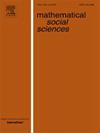Aggregating incomplete rankings
IF 0.5
4区 经济学
Q4 ECONOMICS
引用次数: 0
Abstract
This study considers a method for deriving a ranking of alternatives by aggregating the rankings submitted by multiple individuals, each of whom need not evaluate all of the alternatives. We call the collection of subsets of alternatives that individuals can evaluate an evaluability profile. For a given evaluability profile, we define an aggregating ranking function whose inputs are the rankings provided by individuals on the alternatives that they evaluate. We investigate the properties of such functions, focusing on modified versions of the properties originally introduced by Arrow and his followers. Whether there exists an aggregating ranking function that satisfies a given combination of the properties depends on the evaluability profile. Accordingly, we identify the necessary and sufficient conditions on evaluability profiles to ensure the existence of functions that satisfy four different combinations of the properties. Finally, we discuss whether these properties are satisfied in a real-world scenario.
汇总不完全排名
本研究考虑了一种方法,该方法通过汇总多个个体提交的排名来得出备选方案的排名,每个个体都不需要评估所有的备选方案。我们把个人可以评估的备选方案子集的集合称为可评估性概要。对于给定的可评估性配置文件,我们定义了一个聚合排名函数,其输入是个人对其评估的备选方案提供的排名。我们研究了这些函数的性质,重点研究了阿罗及其追随者最初引入的性质的修改版本。是否存在满足给定属性组合的聚合排序函数取决于可评估性配置文件。因此,我们确定了可求性轮廓上的充要条件,以保证满足四种不同性质组合的函数的存在性。最后,我们将讨论在现实场景中是否满足这些属性。
本文章由计算机程序翻译,如有差异,请以英文原文为准。
求助全文
约1分钟内获得全文
求助全文
来源期刊

Mathematical Social Sciences
数学-数学跨学科应用
CiteScore
1.30
自引率
0.00%
发文量
55
审稿时长
59 days
期刊介绍:
The international, interdisciplinary journal Mathematical Social Sciences publishes original research articles, survey papers, short notes and book reviews. The journal emphasizes the unity of mathematical modelling in economics, psychology, political sciences, sociology and other social sciences.
Topics of particular interest include the fundamental aspects of choice, information, and preferences (decision science) and of interaction (game theory and economic theory), the measurement of utility, welfare and inequality, the formal theories of justice and implementation, voting rules, cooperative games, fair division, cost allocation, bargaining, matching, social networks, and evolutionary and other dynamics models.
Papers published by the journal are mathematically rigorous but no bounds, from above or from below, limits their technical level. All mathematical techniques may be used. The articles should be self-contained and readable by social scientists trained in mathematics.
 求助内容:
求助内容: 应助结果提醒方式:
应助结果提醒方式:


